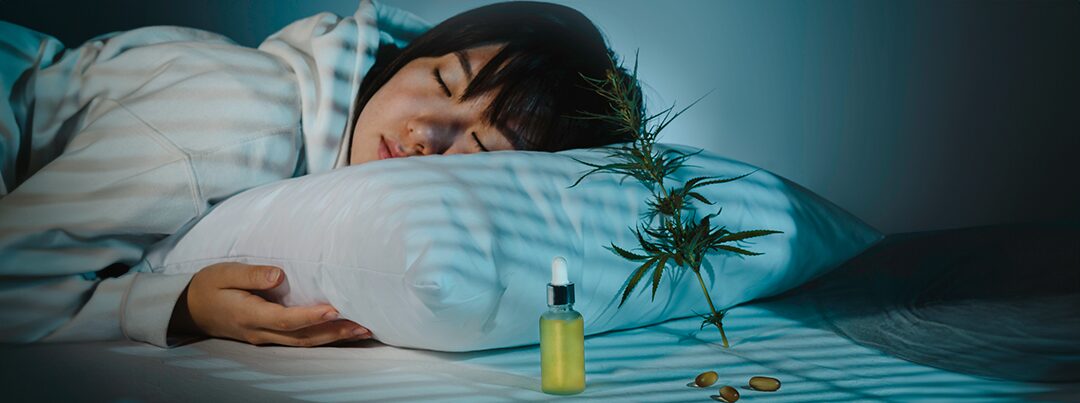Certain strains of marijuana are known for their mellowing properties. In fact, the laid-back mood that accompanies a particularly good smoke sesh is definitely a stoner cliche. But could cannabis actually help you get a restful night’s sleep?
There is some research available on cannabis and sleep, particularly around whether cannabis could provide relief from certain sleep disorders like insomnia, sleep apnea, restless legs syndrome, PTSD-related nightmares, REM behavior disorder and narcolepsy. Findings do suggest some potential benefits, but most studies reflect a small sample size, and the results have been mixed.
According to a study by the Sleep Foundation, “Around 70% of young adults that casually use cannabis report that they do so to help them sleep. Among people who use cannabis for medical reasons, such as pain relief, as many as 85% say it improves their sleep.”
And while occasional marijuana use has been shown to help users sleep, regular and long-term use may have the opposite effect.
Whether you struggle with the occasional restless night or suffer from a sleep disorder, you might be wondering if reaching for marijuana could help you sleep. Keep reading to discover:
- Why cannabis makes you sleepy
- Best cannabis for sleep
- Tips for safe use
It’s important to note that the research around cannabis as a sleep aid is still relatively new, and you should always consult a health care provider before using any substance for medicinal or sleep aid purposes.
Understanding Cannabis for Sleep
What about the chemical makeup of cannabis makes you feel sleepy? It boils down to the way cannabis interacts with your brain. According to the University of Michigan Department of Psychiatry, “It is thought that cannabis binds to specific receptors in the brain, sending sleeping-promoting messages and reducing the brain’s arousal.”
Cannabis is made up of two primary compounds: THC (tetrahydrocannabinol) and CBD (cannabidiol).
THC and Sleep
THC is the compound that typically gives you that classic “high” feeling. And while it does have sedative properties for many people, some experience the opposite effect, making them feel restless or anxious. A lot can depend on the dose and how your body processes THC. A 2017 study found that THC can help people fall asleep faster but might negatively affect sleep quality over time.
CBD and Sleep
Dose is the key when it comes to CBD and sleep as well. In lower doses, CBD may be energizing or have little effect on sleep, while medium or high doses could help treat disorders like insomnia. CBD may also reduce the time it takes to fall asleep and increase total sleep time.
Benefits of Cannabis for Sleep Disorders
Much of the research around cannabis and sleep has focused on chronic pain or sleep disorders. One study found that synthetic cannabinoids may reduce the number of apnea events in the short term for those with obstructive sleep apnea by affecting serotonin levels.
The same study suggested that CBD may help with excessive daytime sleepiness, increase sleep quality for those with chronic pain and reduce PTSD-related nightmares.
Best Cannabis Strains for Sleep
If you’ve interacted with cannabis in any capacity, you’re probably familiar with the two primary strains: Indica and Sativa.
Broadly speaking, Sativa strains are thought to have higher levels of THC, which is responsible for the euphoric, high effect that marijuana is famous for. Indica strains, on the other hand, usually have higher levels of CBD. Hybrids are a mix of Indica and Sativa and have their own unique properties and effects.
While this is common weed knowledge, there is some research that claims the differences between the two are mostly subjective and have more to do with other components that comprise marijuana, like each plant’s terpenoid content.
When choosing the best strain for sleep, check in with your trusted budtender and experiment with what works best for you.
Getting Starting With Marijuana for Sleep
Curious about incorporating weed into your sleep routine?
- Ask your budtender. Your knowledgeable guide can help you determine the best strains and dose to get started.
- Start slow. Start with a low dose and gradually increase until you find a dose that is effective.
- Understand consumption methods. Smoking or vaping will have quicker effects, while ingesting via edibles may delay efficacy.
- Proceed with caution. Even when used in the short term, researchers have found that those who use weed as a sleep aid do sleep better in the first part of the night, but then sleep becomes more fragmented.
Most sleep aids, whether natural like marijuana or pharmaceuticals you can buy over the counter, are not intended for long-term use. While marijuana use can help in the short term, continual and heavy use can actually have the opposite effect.
If you’re having sleep problems, be sure to consult with your health care provider to discuss the best and safest ways to get a good night’s sleep.

